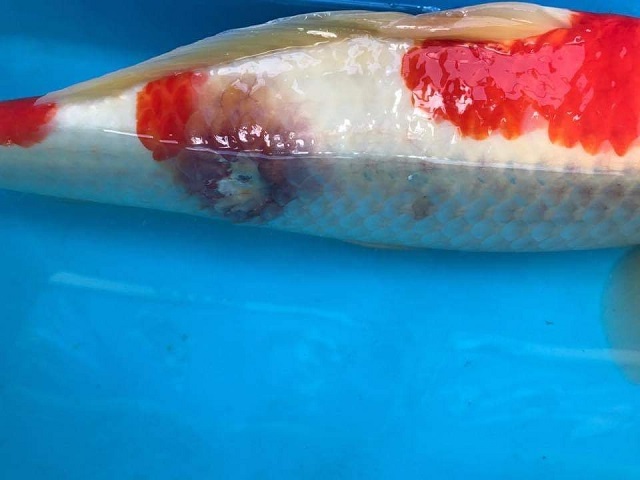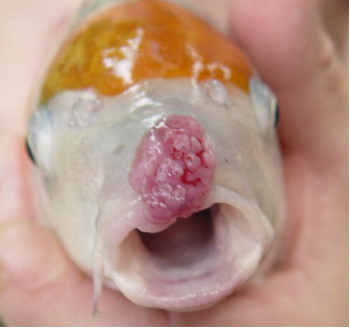What is squamous rot?
Scab rot is one of the common diseases that affects Koi fish. This disease is caused by various bacteria, but mainly Aeromonas and Pseudomonas bacteria. The disease usually appears when Koi fish have skin damage or their immune system is weakened.

Specific symptoms
· Scaly rot appears on the skin of the fish, which can be patchy spots that emerge or become viscous. These scale rot usually appear on the body and fins of fish.
· The color of the scales changes, which can become gray, brown or black. This can be a sign of damage and infection.
· Koi fish may lose scales or lose scales. This is due to damage and infection on the fish's skin.
· The skin of the fish becomes rough, there may be ulcers or lesions. This is the result of bacteria or fungi causing damage to the skin of the fish.
· Koi fish may change their behavior such as losing agility, being inactive, not eating, or not reacting to their surroundings. This can be because the fish's body is affected by the disease and causes fatigue and weakness.
Causes of scab rot
In addition to Aeromonas and Pseudomonas bacteria, scab rot can also be caused by other causes, including:
· Other bacteria: In addition to Aeromonas and Pseudomonas, other bacteria such as Flexibacter, Flavobacterium, and Streptococcus can also cause scab rot.
· Poor environmental conditions: Pond and lake water that is not clean, contains a lot of pollutants, or does not ensure the necessary amount of oxygen for Koi fish can also reduce the resistance of fish, increasing the risk of bacterial infection and the development of scab rot.
· Stress: Stressors such as changes in temperature, water quality, overcrowding of fish in ponds, or transporting koi can also reduce the fish's immune system, increasing the risk of bacterial infections and developing scab disease.
· Inadequate diet: Koi fish lack essential nutrients such as vitamins, minerals, and protein can also reduce the fish's resistance, increasing the risk of bacterial infection and developing scab rot.
· Transmitted from a sick fish: This is a highly contagious disease, fish can be transmitted from an infected fish in a lake
How to prevent and treat scab rot
· Drug treatment: Use antibacterial or antifungal drugs to destroy pathogens. It is necessary to consult a specialist to choose the right drug and use the correct dosage as directed.
· Improving the living environment: Clean your aquarium regularly to remove pollutants and ensure that the pond water is always in a clean condition. At the same time, provide enough oxygen to the fish by using an oxygen pump for the lake.
· Reduce stress: Create a stable habitat for fish by maintaining temperature and water quality, limiting the overload of fish in the lake. Avoid strong impacts such as transportation or changes in the habitat too quickly.
· Provide a nutritious diet: Make sure your fish is getting enough of the nutrients they need by using a high-quality and varied diet. Attention should be paid to providing enough protein, vitamins and minerals for Koi fish.
· Strengthen the immune system: Use nutritional supplements or immune-boosting preparations to help Koi fish strengthen their resistance and prevent scab rot.
· Isolate infected fish: If you notice that Koi fish are infected with scale rot, separate them from other fish to prevent the spread of the disease. Place infected fish in a separate pond and treat them carefully.
Above is some information about scale rot in Koi fish. Scab rot, if infected, will adversely affect the health and beauty of koi fish, so when detecting the above symptoms, it is necessary to check and treat quickly to prevent the spread of the disease and contact us immediately for specific advice on the fastest steps to handle and treat the disease.
Good luck!





